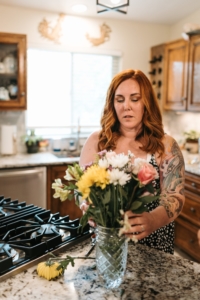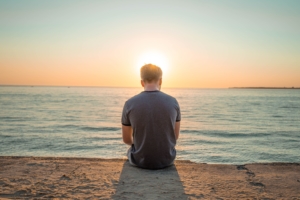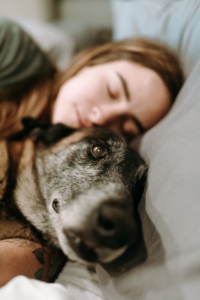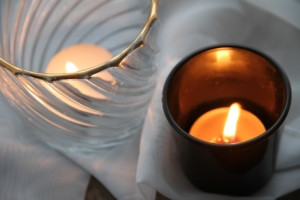Our bodies are well designed to help us cope with everyday stresses such as work deadlines, exams, social interactions, and relational conflict. Each of these situations affects us physically, as well as emotionally and mentally. The human body often interprets these various challenges as stressors and potential threats to its wellbeing, despite efforts to reduce anxiety.
 Usually, this isn’t a problem because once the situation is handled, your body returns to its typical state of rest and the stress hormones released during the stressor event gradually diminish.
Usually, this isn’t a problem because once the situation is handled, your body returns to its typical state of rest and the stress hormones released during the stressor event gradually diminish.
However, if you are chronically stressed, or if you’re an anxious person, your body will constantly interpret even everyday events as potential threats, and its basic posture is to be in a five-alarm state. Our bodies were not meant to be in a state of alarm all the time, and remaining that way has many negative health impacts, especially over the long term.
With many potential sources of stress and anxiety, being able to reduce anxiety is a vital skill to protect your health and wellbeing. This article will dig into a few effective tools you can use to reduce anxiety. Santa Monica Christian Counseling can help you in dealing with these challenges and provide support in managing anxiety effectively.
The benefits of reducing anxiety
Being chronically anxious is not good for you. When you’re anxious, your body prepares itself for attack through the fight-or-flight response system.
Hormones such as cortisol and adrenaline are released into the body, triggering physiological responses such as fast heart rate, tense muscles, tunnel vision which leads to increased focus, butterflies in the stomach which result from blood being redirected away from certain organs toward the muscles, and so on. Your body is preparing for a crisis, and it needs these resources to deal with it.
When the crisis is over, your body slowly returns to its state of equilibrium. Through exercise and good sleep, adrenaline is used up and excess levels of cortisol are flushed from your system.
Chronic anxiety means that your body is under constant pressure and in a permanent state of crisis. It doesn’t get a good chance to recover and return to its equilibrium. This also means that your organs such as your heart are under inordinate pressure, which can lead to issues such as high blood pressure, heart arrhythmia, and higher risk of heart disease.
Other issues such as diabetes and a higher risk of developing depression are also a factor. All this is to say that being anxious all the time isn’t good for you.
Because being chronically anxious is not healthy for you, it follows that reducing anxiety brings several significant health benefits that are worth pursuing. For one thing, reducing your levels of anxiety is better for your physical health.
 You put less stress on your body. Additionally, excess worry and fear make it more difficult to fall asleep and stay asleep through the whole night. Getting good sleep is absolutely essential for one’s health, and anxiety often interferes with that.
You put less stress on your body. Additionally, excess worry and fear make it more difficult to fall asleep and stay asleep through the whole night. Getting good sleep is absolutely essential for one’s health, and anxiety often interferes with that.
Another benefit of reducing anxiety is that it makes you more productive. Often, when you’re anxious it makes it hard to focus on your tasks. Depending on the severity of the anxiety, it can interfere with your ability to perform well.
If your job requires you to interact with people or make presentations, or if those activities make you feel anxious, it will hamper your productivity and affect which aspects of your career are open for advancement.
Lastly, another benefit of reducing anxiety is that you’re better able to enjoy your life. Anxiety can take up a lot of head space, particularly if it affects everyday decisions such as where and when you eat, with whom you’re socializing, and so on.
For individuals whose anxiety is quite severe and can be termed an anxiety disorder, a lot of time and energy is often directed toward compensating for the effects of anxiety and concerted efforts to overcome their anxiety.
If a person reduces his or her levels of anxiety, that opens life up to new possibilities and new ways to explore one’s world. You can try new things without overthinking it, and new experiences are quite important for personal growth and development.
Effective tools to help you reduce anxiety
Reducing your anxiety is a good move for your overall wellbeing. Knowing how to reduce anxiety will help you on your journey toward a more easygoing existence. It’s important as you try to reduce your anxiety that the very effort of reducing anxiety doesn’t itself become another source of anxiety.
For instance, some people struggle with insomnia and worry that they are not getting the amount of sleep they need to be healthy. This can often be the case with people as they get older. The problem is that as a person worries about the fact that he or she isn’t getting enough rest, that very anxiety can make it difficult to get good sleep, hampering his or her efforts to get good amounts of sleep.
To get the most out of these tools, give yourself time to learn how to use them, and allow them time to gradually begin turning things around. Anxiety often stems from learned behaviors and habits that took years to form and some that may have been inherited, so don’t expect these things to change overnight. Give it time and celebrate the wins whenever you get them.
Here are six tools to help you effectively reduce anxiety.
1. Change up your diet.

What you eat and drink has a huge impact on your overall health, and some foods have direct effects on one’s anxiety levels. It’s always a good idea to eat healthy, so make sure to get some fresh fruit and vegetables in your diet, avoiding fatty and fried foods. A Mediterranean diet is a good plan, and it helps to reduce your sugar and caffeine consumption
Caffeine, which is more commonly found in some carbonated drinks and in coffee and tea, can make you feel more anxious because of its physiological effects. When you eat well, you’ll feel better, and that too can help you overcome worries about your health.
2. Get some exercise in.
If you’re all adrenalized-up with nowhere to go, getting some exercise is a great way of dissipating some of that nervous energy. Not only that, but the endorphins that your body releases during exercise help to reduce the cortisol levels in your body and induce a sense of well-being.
The high that people like runners feel is real, and through exercise you too can enjoy those feel-good neurochemicals. However, you don’t have to run long distances or climb mountains to reap these benefits. You can walk, swim, bike, dance, kayak, or whatever you enjoy and have clearance from your doctor to do.
3. Get good sleep.
As mentioned earlier, sleep is an important part of our health. Good sleep is important for weight control, emotional regulation, and so much more. When you sleep, your body also processes the stress hormone cortisol, effectively allowing you to de-stress while you sleep.
Good sleep starts with good sleep habits and routines, including turning off electronic devices around 45 minutes before bed, creating an environment that’s conducive for sleep, and having a consistent sleeping and wake up time. This is what is often called good sleep hygiene, and maintaining it is a huge help for reducing anxiety.
4. Grow in your ability to take your thoughts captive.
Anxiety is often fueled by runaway thoughts that inject themselves into your life. These thoughts are disruptive, and they are often unhealthy in various ways. You can begin to take your thoughts captive through a variety of practices such as journaling and mindfulness, thereby disrupting the cycle of anxious thoughts and behaviors.

When you journal well, it allows you to discern the patterns of your anxiety, especially the triggers for your anxiety, and the patterns of your unhelpful ruminations. Becoming aware of your own anxiety is a great way to deal with it, as is learning how to articulate those anxious thoughts.
These thoughts often need to be subjected to the light of Scripture, especially when they are false, or lead you to catastrophize as though God is not in control. Laying them out clearly and taking them captive helps you disrupt unhealthy thought patterns.
5. Plan well and stick to your plan.
Often, anxiety is induced by being under-prepared. One way to reduce that kind of anxiety is to plan well and stick to the plan, avoiding procrastination along the way. Sometimes, making a change such as adding some structure to your life can make a world of difference. It can make your life a little less chaotic, a bit less haphazard and out of control, and that can help reduce some anxiety.
6. Therapy and medication.
For some people, their anxiety requires medication to allow them to function in daily life. It is important to seek professional medical attention for a diagnosis of anxiety or an anxiety disorder. Medication will make a difference, but it often needs to be coupled with lifestyle changes as well as therapy.
Making changes in your life isn’t easy, especially if it means changing deep-seated habits and beliefs. Anxiety is often inherited, or it is adopted through significant formative moments in a person’s life.
Changing the narrative and reorienting one’s thoughts and behaviors is a tricky task. Finding help through a mental health professional such as a therapist or counselor will assist you as you make those necessary changes in your thought life and habits.
In Scripture, God says he desires for people to have peace. One of the most encouraging and powerful commands is: “Do not be anxious about anything, but in every situation, by prayer and petition, with thanksgiving, present your requests to God. And the peace of God, which transcends all understanding, will guard your hearts and your minds in Christ Jesus” (Philippians 4:6-7, NIV).
A Christian counselor can help you by providing a space in which to explore your anxiety and come up with effective strategies to reduce anxiety and enjoy God’s peace. If anxiety is interfering with your life and detracting from the fullness of what you want to accomplish, reach out to Santa Monica Christian Counseling today for individual or group Christian counseling for anxiety.
“Arranging Flowers”, Courtesy of Sandra Seitamaa, Unsplash+ License; “Sitting on the Beach”, Courtesy of Erwann Letue, Unsplash.com, CC0 License; “Girl and her Dog”, Courtesy of Sandra Seitamaa, Unsplash.com, Unsplash+ License; “Candles”, Courtesy of Melanie Dijkstra, Unsplash.com, CC0 License


